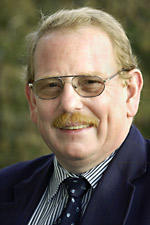8th Einstein Lecture Dahlem: Reinhard Genzel
Of massive Black Holes and Galaxies
Oct 20, 2008
The general theory of relativity predicts that mass concentration above a critical density will turn into “black holes” whose event horizon makes any communication with the exterior world impossible. Since the discovery of the quasars about 45 years ago, indications have increased that in the center of galaxies such massive black holes exist and transform gravitational energy into radiation by accretion of matter.
New measuring methods in the infrared and radio range have provided for the center of our galaxy the convincing evidence of the existence of a massive black hole. This also affirms the hypothesis that black holes exist in most galaxies, and, that these black holes emerged in close interaction with the galaxies during the early days of the universe. for the hypothesis that massive black holes exist in most galaxies, and, that these black holes emerged in close interaction with the galaxies during the early days of the universe. Regarding the center of the galaxy, there is by use of Simultaneously, it has become The 8th Einstein Lecture Dahlem on October 20, 2008, will describe the substantial gain in knowledge regarding these important questions in the field of cosmology and will also demonstrate the close relation between scientific progress and complex technology in modern astronomy.
Reinhard Genzel (1952) completed his studies of physics at Universität Bonn with a diploma (1975) and doctorate (1978). He prepared his thesis at Max Planck Institute (MPI) for Radio Astronomy in Bonn. Subsequently, he held a postdoc position at Harvard-Smithonian Center for Astrophysics and became Miller Fellow at UC Berkeley. After that, he became associate and full professor of physics at UC Berkeley where he was visiting professor from 1985-86. Since 1986, he is director at MPI for Extraterrestrial physics in Garching, Germany. He is honorary professor since 1988 at LMU Munich and since 1999 full professor (part time) at UC Berkeley. His working area covers astrophysics of galaxy nucleus, star formation, evolution of galaxies and black holes. Genzel was honored with various prizes including the Gottfried Wilhelm Leibniz Prize of the German Research Foundation (DFG), the Newton Lacy Prize of the American Astronomical Society, the Stern-Gerlach-Medal for Experimental Physics of the Deutsche Physikalische Gesellschaft (DPG, German Physical Society), the Balzan Prize for Infrared Astronomy, the Albert Einstein Medal of the Albert Einstein Society Bern (CH) and the Shaw Prize in Astronomy. He is a member of various German and foreign scientific academies.

